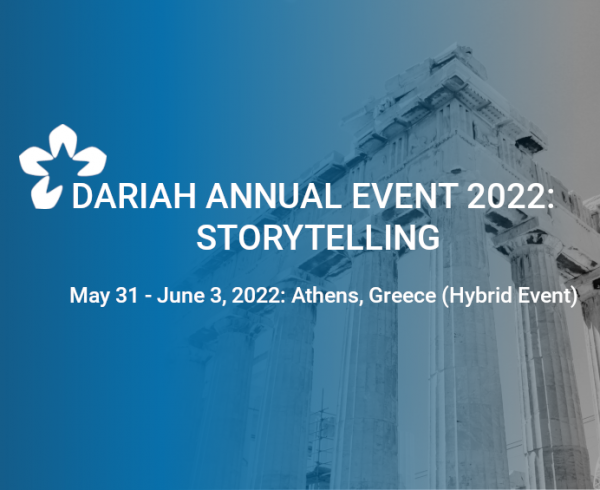Registration
We are pleased to announce that the registration to the DARIAH Virtual Annual Event is now open. We kindly ask you to register for each session that you wish to attend. All meetings will take place via Zoom and the Zoom links will be distributed to registered participants a day or two prior to each session.
Please make sure to register at least a day in advance, so that you receive the link to the session. If you registered later and did not receive the link, please send us an email at dariah-ae-2020@sciencesconf.org and we will try to accommodate you. The registration will remain open until the last session of the event in December.
Programme
The programme has been restructured to accommodate all sessions and to provide all attendants with an engaging virtual experience. The papers, panels, social events and keynote speech will be held on November 10-13, 2020 while workshops, synergy sessions and Working Group meetings will be organised in weekly sessions from October 7-December 2. Posters will be presented in an online exhibition during the central week of the event, from November 9 to 13. The full programme of the event is now finalised and can be found here.
Poster Exhibition
We are happy to launch the poster exhibition space for the DARIAH Virtual Annual Event. The online exhibition will be open during the central week of the event, between November 9 and November 13, and visitors will be invited to vote for the best poster. The winning contribution will be announced on Friday, November 13, at 17:00-18:00 CET at the final Social Event and Closing Remarks session, alongside the best paper which will be selected by the Programme Committee of the event.
You can explore the exhibition here: www.virtualdariah2020.dariah.eu
Best Poster and Best Paper Awards
We are happy to announce awards for the best poster and best paper of the 2020 Annual Event. Thanks to DARIAH-HR, the winners will be invited to present their poster/paper during the 2021 DARIAH Days in Zagreb, Croatia, hosted by DARIAH-HR. DARIAH-HR will cover travel and accommodation expenses (up to 500 eur/person).
The Best Poster Award goes to Maurizio Toscano, L. Bocanegra Barbecho, Salvador Ros Muñoz, Elena González-Blanco for their poster ‘Insights on scholarly primitives from Digital Humanities research in Spain‘.
Honorable mentions go to Luise Borek and Canan Hastik for their demo submission ‘TaDiRAH as Linked Open Data’ and to Grzegorz Bryk, Alejandro Benito, Michał Kozak, Cezary Mazurek, Szymon Płaczaszek, Roberto Theron for their poster ‘Supporting Decision-Making in the Entity Normalization Task. On the Example of PROVIDEDH’.
The Best Paper Award goes to Costas Papadopoulos and Susan Schreibman for their paper ‘3D Scholarly Editions: Scholarly Primitives Reboot’.
Honorable mentions go to Sepideh Alassi and Lukas Rosenthaler for their paper ‘e-Version of the Republic of Letters’, Vicky Dritsou and Maria Ilvanidou for their paper ‘Integrating archival materials for the study of the turbulent Greek 40s’ and to Goran Zlodi for his paper ‘Approaches to Collaborative Multilingual Thesauri Development in Educational Context’.
Social Events
There are two social events planned during the central week of the DARIAH Annual Event, on November 12 and 13, hosted by Croatia and Greece respectively.
The Social Event by Croatia will be held on November 12, 17:00-18:00 CET with the aim of Bringing ZAGREB to YOU! The Croatian team decided to bring the city to you by preparing the best possible 60-minute invitation, so that you visit the city some other time when Corona will only be a popular beer to toast with.
The Social Event by Greece will be held on November 13, 17:00-18:00 CET and will be a Dance-along! For the Greek-themed Social Event, we would like to invite all participants to dance along with us in preparation and anticipation of the next DARIAH-EU event in Athens.
Topic of DARIAH 2020: Scholarly Primitives
Topic of this year’s event is Scholarly Primitives.
Twenty years after John Unsworth first formulated scholarly primitives as a set of recursive and interrelated functions that form the foundations of research activities across disciplines, theoretical frameworks or eras, the event will be an opportunity to revisit and freshly interrogate both the notion and the scope of scholarly primitives. To what extent does this particular set of scholarly primitives still correspond to our understanding of what humanities scholars do on a day-to-day basis? Has our understanding of research workflows changed over time significantly enough to require a new classification?
DARIAH is happy to announce John Unsworth as keynote speaker at the Virtual Annual Event 2020.
For more information follow #DARIAH2020 and check the event’s website at https://dariah-ae-2020.sciencesconf.org/














